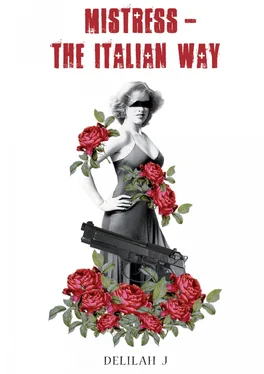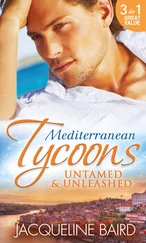“Attention at the platform! Train floating in!”
The new slogan for the successor of the “wheels”, the horsepower from Southern Italy. The new means of transportation in Italy, the overhead railway, feathered with corrupt machinations? How else would this be financed? Everyone has a share: a percentage share in the directorships and executive boards - same as ever: Amos, Bellarosa, the Gransignore, fashion manufacturers and all the rest of the Clan. Careful, the shares are down! Calling all stock exchanges! I am reminded of Pasquale -the character form Roberto Saviano’s book “Gomorrah”. Pasquale is a tailor in Caserta Province north of Naples. He makes the most beautiful dresses, creates what even designers can’t put on paper. Pasquale himself has no idea for whom he sews those badly paid dresses. They come down from Milano, give their orders to whoever promises to work fastest and cheapest. For starvation wages, without security. They only survive for as long as they can sew. The alternative is to get involved with the Clan proper: drugs, human trafficking, garbage crises. The planned poisoning of the earth. Murdering their own families - this generation and the next and the ones after. They stop at nothing. The fish provided by the Mediterranean around Naples is unfit for human consumption thanks to the toxic waste illegally sunk into ocean and earth. People fall ill, die. Nobody wants to know. Is it them, the Clan from Milano and Ferrara, who make their profits that way? One day, Pasquale sees Angelina Jolie in the papers, on television. Pasquale can’t go to Ponza, where they are at home - the mighty members of the Clan. Pasquale does not believe his eyes when he sees Angelina Jolie in HIS dress. He who gives his talent, his skills, for a few cents an hour, to be able to feed his family. He gives up and never sews again. Instead, he joins the Clan. Life is hard for him and his family. The only alternative left for him - as brought about by the Clan - is the Clan. That’s what Roberto Saviano tells us in his book “Gomorrah”.
Back to the overhead railway: they want to have it manufactured down here, near Naples - the new railway. Utilizing public funds to set up tax avoidance schemes for some selected clowns of Northern Italian society? Everything rolling nicely. Except for their yachts, which float, and their private planes and helicopters, which lift off, just like they do themselves. Among their own kind with all their old millionaire and billionaire chums on Ponza. The olden days music box blares “Oh sole mio” in the little bar on Ponza, down by the harbour, where I linger, observing, while the Monopoly players on the island nurse their power and glory. The jukebox warbles “Azzurro, il pomeriggio e troppo azzuro e lungo per me” in mono. Drop another euro in and I’ll have free choice again.
In Germany, we know the Molise Region predominantly from Jan Weiler’s humorous descriptions in “Maria, He Doesn’t Like It”, where, with the utilization of every possible bit of love for Italy, he depicts Antonio Marcipane from Campobasso in a way that moves the German soul to tears. Panettone. If you don’t eat, you don’t like it. That’s logic, isn’t it? Italian logic. Yes, it is the smallest region of Italy and one of the poorest. Dot-tore Amos, my hero, didn’t have enough to eat as a child, was left on his own as both parents had to work. They didn’t even have a loo in Molise. His place of birth, synonymous with the misery of an entire region.
”My parents loved me,” he tells me, tears in his eyes.
“Even though they beat you all the time?” I ask, provocatively and disgusted, while applying dark red nail varnish.
“Of course! You don’t understand! That’s love.”
Love, the Italian way, I think.
“And paint your nails more delicately. White or pink. Natural-looking. I want you soft and fragile.”
Then the emigration to Emilia Romagna. A career created in Ferrara: father working in the factory, on one of Bellarosa’s many production lines. His mother is a housemaid. Maybe she’s trying to see herself in the role of the signori for whom she works.
“That’s why she chose this name,” Amos explains to me.
The beloved, the lover. Amos, the lovely! It’s not that hard to move up. The real challenge is to behave as though that’s where you already come from - UP THERE - not from down here. Amos learned well. And turned into a carbon copy. A bad copy. The replica of Bellarosa and her way of life.
CINDERELLA THE ITALIAN WAY
Of course, every Saturday his sisters also sit around the traditional lunchtime table in Ferrara. Brunilda is divorced, one son. Brunilda and Petunia - the two sisters from Cinderella. When Brunilda’s son was eleven, Dot-tore went to visit him in England - the kid needs to learn English. So he sends him off to a summer camp, where all the Italian kids go who have parents and uncles with no gift for languages. Naturally, they speak Italian there, learn hardly any English. I’m waiting for Dottore in a small café - at long last, I’m allowed to smoke! As Brunilda can’t very well raise her son on her own, Dot-tore has assumed the male role and control in this game. Power and control. He accuses his sister and her son of separation anxiety - an inability to step back from each other, that’s what his inner amateur psychologist says. Years later, he’ll repeat that diagnosis. They are all called Franco: Franchino, Francesco, Frank - or similar. Even the dog, a Yorkshire terrier who peers out of Petunia’s tiny Gucci handbag. Has to be pure-bred. And small
- big and snappy they already were themselves. Big from Amos’ money and power. Dottore, my God of Love, carried the poor creature back with him on the plane, from England. Presumably they both travelled business class.
“Coffee, tea, me?” he heard the stewardess ask, in his randy fantasies.
Today, the dog was replaced by Matto, the crazy one. Another Yorkshire terrier. Meanwhile, they are all well fed: Mamma, Brunilda, Petunia, Petunia’s husband, Franco & Francesco in Ferrara underneath the socialist haze of Emilia Romagna, thanks to Dottore and of course Bellarosa. Today, Brunilda wears Moschino and Versace
- always a little on the cheap side. It was their mother who named them, after Cinderella’s evil sisters who wanted him, Amos, the prince. These days, Amos reminds me only of Lord Farquaad from the movie Shrek. Mean, small, with an ego larger than the sum total of all the crisis-stricken Southern European countries. Lifted up onto the high horse by Bellarosa and the Gransignore. His legs are too short to get up by himself. Brunilda has a penchant for Southern Italian island dwellers who have problems keeping their virility under control. She brings one of them back to Ferrara, as a souvenir. Of course he doesn’t do any work; Amos gets to bankroll his sister’s pussy-mates as well, now that she’s able to hold on to one of them for a short while, thanks to Amos’ life of luxury. Dottore believes that his older sister Brunilda is hot and up for anything in bed.
“I am certain she needs it,” he presumes.
I wonder on what exactly he has based those thoughts about his sister... Confirming his instinct by her choice of men: hairy super-Latinos from the South, who proceed to conduct their lives at Amos’ expense. They only speak one language: Neapolitan. Not Italian. That’s also how they act. A woman in and around Naples - as a matter of fact, in the entire South of Italy - has basically only one justification for leaving the house: to go shopping. That’s where that sentence comes from:
“I’m going out to get some bread.”
Generally speaking, she’ll call out this sentence to her family, her husband, the neighbours. So that everybody knows that she’s not being unfaithful. She’s just going out to get some BREAD. Even nowadays, there’s a lot of that going on in Naples. It’s surprising to us Northern or Central Europeans, how often some women go out to buy bread. A left-over from the olden days, when women were only allowed to go out for shopping purposes, “fare la spesa”. In some regions, things haven’t changed to this day.
Читать дальше












